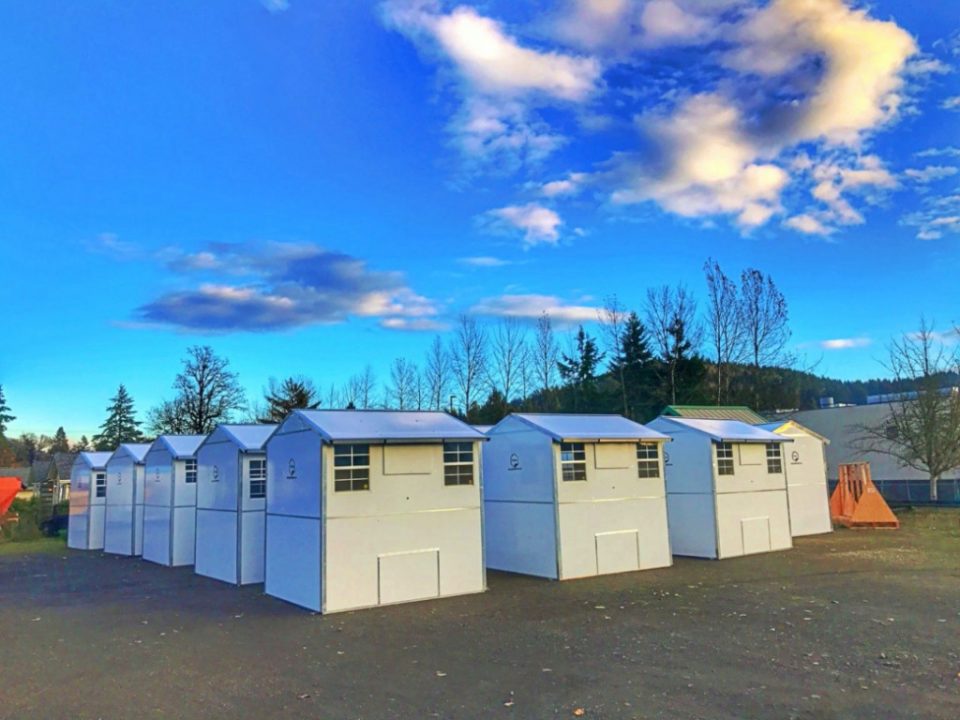As night temperatures continue their gradual seasonal decline, a new model of warming shelters is set to debut in Cottage Grove this December.
The Cottage Grove City Council voted for the purchase of 18 Pallet Shelters on Oct. 26, addressing an anticipated need to secure shelter this winter for the unhoused.
Currently erected and standing by in the Cottage Grove City Shops property, the shelters are awaiting site preparation, which is estimated to be completed mid-December.
The shelters are manufactured by the Washington-based company Pallet, which defines itself as a “social purpose company” aiming to end unsheltered homelessness and develop a nontraditional workforce.
The structures are built to be an efficient, safe and affordable option for temporary cottage-style housing. Taking only about 30 minutes to set up, the insulated shelters can be snapped together on site and include amenities such as electrical connections, heat, windows, beds, mattress and a door which locks from the inside.
The units can also be easily unassembled and stored on a pallet when not in use.
Made from aluminum and plastic composite materials, the structures are resistant to rot, durable and easy to disinfect for day-to-day use.
Coming in two sizes, 64 and 100 square feet, the city has 15 of the smaller units and three of the large at its disposal.
Pallet Shelter prices run about $5,000 for small units and $7,500 for the larger, making the purchase of the units in themselves nearly $100,000.
Additional need for other facilities may add another $20,000 to $30,000 to the cost, said City Manager Richard Meyers.
To pay for the shelters, the city can access its Federal Coronavirus Relief Fund, a sum of $328,000 which must be spent before the end of the year. The Pallet Shelter project would fall under the relief fund’s umbrella by offering cottage-style housing as opposed to congregate housing, thus diminishing the risk of spreading the coronavirus.
The city is also expecting assistance from Lane County, which would fully cover the capital costs to prepare the site and infrastructure.
The chosen site for the shelters is a city lot behind the post office on N. 12th Street where electric, water and sewage are already connections available.
When site preparation is completed, the shelters can be moved in and immediately opened to those in need on the next qualifying freezing night.
Under the plan, the lot would be fenced off and include portable toilets, hand-washing stations and canopies to protect the facilities.
Collaboration on the project has included input from several groups, including Beds for Freezing Nights, a nonprofit group which normally operates from Nov. 15 through March 31, providing safe, warm places for the unsheltered to sleep when nighttime temperatures drop to 29 degrees or below.
The challenges faced in the group’s operations and securing volunteers have been complicated due to concerns surrounding COVID-19 this year, however.
Local nonprofit Community Sharing has taken up the operating role of the project, said Community Sharing Executive Director Mike Fleck, dubbing it the Community Sharing Warming Shelter. He added that Beds for Freezing Nights will still be providing support.
Community Sharing is pursuing its own avenues of funding for the project through the county, with which it already has a contract, to pay for expenditures such as bedding and a staff position, said Fleck.
The warming shelter project will also continue to operate with the nighttime temperature threshold of 29 degrees or below.
While some members of the community have expressed concern that the site will devolve into a unsupervised homeless camp and attract more transient traffic, advocates for the Pallet Shelter project have countered that the highly structured and temporary nature of the site would prevent such things from happening.
Beds for Freezing Nights Board President Ruth Linoz pointed out in October’s city council meeting that the group’s criterion for activation at 29 degrees or below encourages priority use of Eugene’s Egan Warming Center and thus reduces the shelter-seeking traffic from outside areas.
Fleck, who is also a city councilor, said he did not anticipate any monetary transaction between the city and the nonprofit, but declared a potential conflict of interest as a precaution in the council’s Oct. 26 meeting.
Community Sharing is still actively seeking volunteers. Those interested in volunteering can contact the nonprofit at 541-942-2176.



